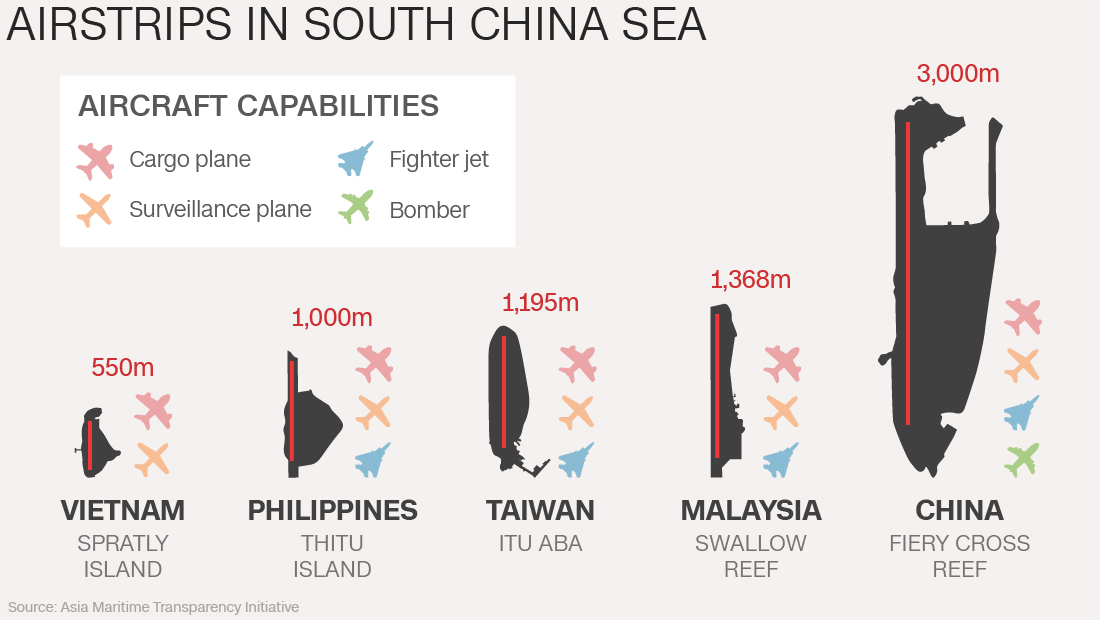China starts patrols in Disputed Waters
Moderator: Community Team
11 posts
• Page 1 of 1
China starts patrols in Disputed Waters
Hopefully, our prayers will be answered and this will result in Global Thermonuclear Warfare. Thankfully, Theresa May is redoubling on the nuclear arsenal.
░▒▒▓▓▓▒▒░
-

 DoomYoshi
DoomYoshi
- Posts: 10728
- Joined: Tue Nov 16, 2010 9:30 pm
- Location: Niu York, Ukraine



























Re: China starts patrols in Disputed Waters
China is patrolling 600 km from its shore line, US are doing it 10 times more then the Chinese... Someone is doing it too far.
Beijing Launches Combat Air Patrols Over South China Sea
I see no chance China to back off from its pretensions on South China Sea, so its up to US to back off.
Lets face it, US carriers and US nukes are not scaring China.
Beijing Launches Combat Air Patrols Over South China Sea
I see no chance China to back off from its pretensions on South China Sea, so its up to US to back off.
Lets face it, US carriers and US nukes are not scaring China.
Even a little kid knows whats the name of my country... http://youtu.be/XFxjy7f9RpY
Interested in clans? Check out the Fallen!
Interested in clans? Check out the Fallen!
-
 GoranZ
GoranZ
- Posts: 2916
- Joined: Sat Aug 22, 2009 3:14 pm






















Re: China starts patrols in Disputed Waters
GoranZ wrote:China is patrolling 600 km from its shore line, US are doing it 10 times more then the Chinese... Someone is doing it too far.
Beijing Launches Combat Air Patrols Over South China Sea
I see no chance China to back off from its pretensions on South China Sea, so its up to US to back off.
Lets face it, US carriers and US nukes are not scaring China.
Neither are China's neighbours. Vietnam, the Philippines and Japan have been strengthening ties because of China's aggressive approach. If things keep escalating this could end in a formal alliance between the three.
-

 waauw
waauw
- Posts: 4756
- Joined: Fri Mar 13, 2009 1:46 pm























Re: China starts patrols in Disputed Waters
'Starts'? China and the US have both been patrolling the South China Sea for a long time now.
-
 mrswdk
mrswdk
- Posts: 14898
- Joined: Sun Sep 08, 2013 10:37 am
- Location: Red Swastika School














Re: China starts patrols in Disputed Waters
---------------DON'T WORRY  ------------------
------------------
---------WHEN I PICTURE THE CHINESE NAVY......I SEE TOYS WE USED TO GET IN CEREAL BOXES LONG AGO. LITTLE PLASTIC SUBMARINES, THAT RAN ON BAKING SODA...IRONICALLY THEY WHERE MADE IN CHINA...

 ConfederateSS.out!(The Blue and Silver Rebellion)...
ConfederateSS.out!(The Blue and Silver Rebellion)... 
---------WHEN I PICTURE THE CHINESE NAVY......I SEE TOYS WE USED TO GET IN CEREAL BOXES LONG AGO. LITTLE PLASTIC SUBMARINES, THAT RAN ON BAKING SODA...IRONICALLY THEY WHERE MADE IN CHINA...
-

 ConfederateSS
ConfederateSS
- Posts: 3929
- Joined: Wed Dec 31, 2008 1:50 pm
- Location: THE CONFEDERATE STATES of AMERICA and THE OLD WEST!
























 7
7 4
4



Re: China starts patrols in Disputed Waters
Air patrols. With loaded nuclear bombers.
http://news.xinhuanet.com/english/2016-07/18/c_135522288.htm
http://www.nytimes.com/2016/07/19/world/asia/china-sea-air-patrols.html?register=facebook
http://www.philstar.com/headlines/2016/07/19/1604466/philippines-talks-hague-verdict-confrontation-china
http://www.globaltimes.cn/content/995184.shtml
http://edition.cnn.com/2016/07/13/asia/south-china-sea-global-conflict-risks/index.html

Of course, China's official response was a video which dropped the very next minute after the Hague announced it's decision. I'm surprised 50-centwdk wasn't paid to post it.
http://news.xinhuanet.com/english/2016-07/18/c_135522288.htm
BEIJING, July 18 (Xinhua) -- The People's Liberation Army (PLA) Air Force has conducted a combat air patrol in the South China Sea recently, which will become "a regular practice" in the future, said a military spokesperson on Monday.
The PLA sent H-6K bombers and other aircraft including fighters, scouts and tankers to patrol islands and reefs including Huangyan Dao, said Shen Jinke, spokesman for the PLA Air Force.
http://www.nytimes.com/2016/07/19/world/asia/china-sea-air-patrols.html?register=facebook
Demonstrators in China called for boycotts at about a dozen KFC outlets on Monday to protest the United States’ role in the South China Sea dispute. But the protests were small compared with previous nationalist outpourings in China, and the state news media warned demonstrators not to disturb social order. The angry mobs of people rallying outside embassies in the Chinese capital, a regular feature in the past when China wanted to vent its grievances, never materialized.
http://www.philstar.com/headlines/2016/07/19/1604466/philippines-talks-hague-verdict-confrontation-china
Yasay added that Wang warned him of a possible confrontation if the Philippines will insist on the ruling of the Permanent Court of Arbitration.
http://www.globaltimes.cn/content/995184.shtml
Beijing has staked its claims in several territorial disputes in the South and East China Seas. Broadly speaking, China’s “nine dash line” (the shorthand reference to China’s self-drawn maritime map) envelops the bulk of these waters and overlaps the claims of Brunei, Malaysia, Vietnam, the Philippines, Indonesia and Taiwan. There are further disputes in the East China Sea with Japan, Taiwan and South Korea. So why is the Philippines the only one to assert its claims under international law?
The answer is simple: China is quite literally raising the costs of challenging Beijing. Following Manila’s early attempts to defend its claims in the Scarborough Shoal, Beijing vented its displeasure by allowing Filipino agricultural exports to rot on the dock and by initiating a finishing ban around waters claimed by the Philippines. Chinese leaders also depressed Chinese tourism to the Philippines. It worked. Within weeks, the Filipino government relented, pulling its ships from the Scarborough Shoal.
Tokyo came in for similar treatment in 2010, when China halted exports of rare earth minerals to Japan amid tensions over competing claims in the East China Sea. In addition to this direct economic bullying, China has also sought to make an example out of the Philippines and Japan, making clear that any country considering a more assertive stance in these disputes can expect similar costs.
China’s use of economic muscle in these territorial disputes goes well beyond coercion. Beijing regularly conscripts China’s state-owned enterprises to help enforce these claims. China’s leading oil company is fond of parking one of its deepwater rigs within Vietnam’s exclusive economic zone, in “one of the most sensitive spots possible.” The company’s chairman once described the rigs as “mobile national territory and a strategic weapon.”
http://edition.cnn.com/2016/07/13/asia/south-china-sea-global-conflict-risks/index.html

Of course, China's official response was a video which dropped the very next minute after the Hague announced it's decision. I'm surprised 50-centwdk wasn't paid to post it.
░▒▒▓▓▓▒▒░
-

 DoomYoshi
DoomYoshi
- Posts: 10728
- Joined: Tue Nov 16, 2010 9:30 pm
- Location: Niu York, Ukraine



























Re: China starts patrols in Disputed Waters
DoomYoshi wrote:Air patrols. With loaded nuclear bombers.
http://news.xinhuanet.com/english/2016-07/18/c_135522288.htmBEIJING, July 18 (Xinhua) -- The People's Liberation Army (PLA) Air Force has conducted a combat air patrol in the South China Sea recently, which will become "a regular practice" in the future, said a military spokesperson on Monday.
The PLA sent H-6K bombers and other aircraft including fighters, scouts and tankers to patrol islands and reefs including Huangyan Dao, said Shen Jinke, spokesman for the PLA Air Force.
http://www.nytimes.com/2016/07/19/world/asia/china-sea-air-patrols.html?register=facebook
Those planes are nuclear-capable. They were not actually loaded with nuclear bombs. There is a big difference. The US flew B52 bombers over the Korean peninsula last year/early this year and no one* got their knickers in a twist about that. It's just a flyover. No one cares.
*except Kim Jong the Incredible
Demonstrators in China called for boycotts at about a dozen KFC outlets on Monday to protest the United States’ role in the South China Sea dispute. But the protests were small compared with previous nationalist outpourings in China, and the state news media warned demonstrators not to disturb social order. The angry mobs of people rallying outside embassies in the Chinese capital, a regular feature in the past when China wanted to vent its grievances, never materialized.
http://www.philstar.com/headlines/2016/07/19/1604466/philippines-talks-hague-verdict-confrontation-china
'Small, isolated protests develop, little else happens'.
Yasay added that Wang warned him of a possible confrontation if the Philippines will insist on the ruling of the Permanent Court of Arbitration.
http://www.globaltimes.cn/content/995184.shtml
The Philippines has yapped at China about this for years now and nothing serious has happened. No one cares about this sort of flaccid gas-bagging.
Beijing has staked its claims in several territorial disputes in the South and East China Seas. Broadly speaking, China’s “nine dash line” (the shorthand reference to China’s self-drawn maritime map) envelops the bulk of these waters and overlaps the claims of Brunei, Malaysia, Vietnam, the Philippines, Indonesia and Taiwan. There are further disputes in the East China Sea with Japan, Taiwan and South Korea. So why is the Philippines the only one to assert its claims under international law?
The answer is simple: China is quite literally raising the costs of challenging Beijing. Following Manila’s early attempts to defend its claims in the Scarborough Shoal, Beijing vented its displeasure by allowing Filipino agricultural exports to rot on the dock and by initiating a finishing ban around waters claimed by the Philippines. Chinese leaders also depressed Chinese tourism to the Philippines. It worked. Within weeks, the Filipino government relented, pulling its ships from the Scarborough Shoal.
Tokyo came in for similar treatment in 2010, when China halted exports of rare earth minerals to Japan amid tensions over competing claims in the East China Sea. In addition to this direct economic bullying, China has also sought to make an example out of the Philippines and Japan, making clear that any country considering a more assertive stance in these disputes can expect similar costs.
China’s use of economic muscle in these territorial disputes goes well beyond coercion. Beijing regularly conscripts China’s state-owned enterprises to help enforce these claims. China’s leading oil company is fond of parking one of its deepwater rigs within Vietnam’s exclusive economic zone, in “one of the most sensitive spots possible.” The company’s chairman once described the rigs as “mobile national territory and a strategic weapon.”
This is literally just a rehash of old news. Nothing new here.
In other words, the ruling has caused nothing to happen except a moderate ramping up of the rhetoric in the short-term.
As you were, people.
-
 mrswdk
mrswdk
- Posts: 14898
- Joined: Sun Sep 08, 2013 10:37 am
- Location: Red Swastika School














Re: China starts patrols in Disputed Waters
f*ck International law and f*ck Chinese neighbors!
Well said, Mrswdk!
Well said, Mrswdk!
-

 Bernie Sanders
Bernie Sanders
- Posts: 5105
- Joined: Tue Sep 08, 2015 2:30 pm










Re: China starts patrols in Disputed Waters
Back to English language reading comprehension class with you, Hillary Bernie.
-
 mrswdk
mrswdk
- Posts: 14898
- Joined: Sun Sep 08, 2013 10:37 am
- Location: Red Swastika School














Re: China starts patrols in Disputed Waters
mrswdk wrote:Back to English language reading comprehension class with you, Hillary Bernie.
Most of us completely comprehend the B.S. you serve on this thread and others.
-

 Bernie Sanders
Bernie Sanders
- Posts: 5105
- Joined: Tue Sep 08, 2015 2:30 pm










Re: China starts patrols in Disputed Waters
Bernie Sanders wrote:mrswdk wrote:Back to English language reading comprehension class with you, Hillary Bernie.
Most of us completely comprehend the B(ernie).S(anders). you serve on this thread and others.
Fixed.
░▒▒▓▓▓▒▒░
-

 DoomYoshi
DoomYoshi
- Posts: 10728
- Joined: Tue Nov 16, 2010 9:30 pm
- Location: Niu York, Ukraine



























11 posts
• Page 1 of 1
Who is online
Users browsing this forum: No registered users

